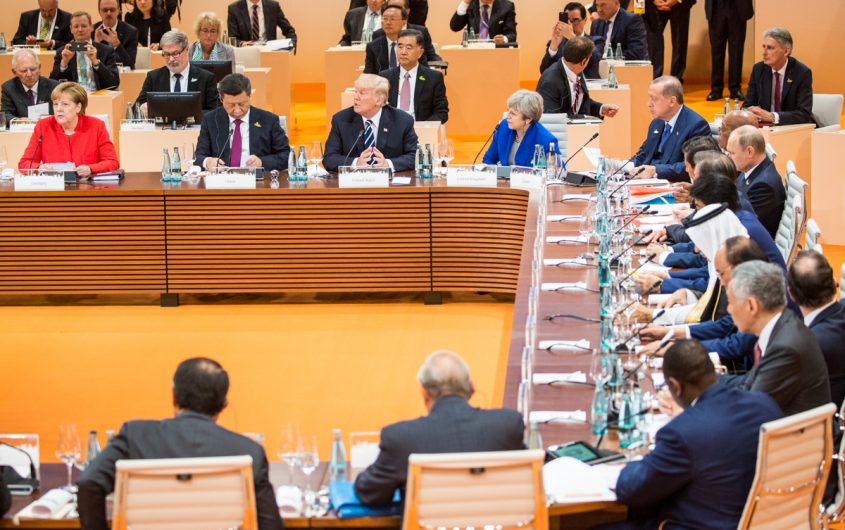
Official White House Photo by Shealah Craighead
The Future of Transatlantic Relations: Necessary and Possible Cooperation at Two Levels

Pia Seyfried
German Bundestag
Pia Seyfried is a legislative assistant for European policy in the German Bundestag and an assistant to the board of Women in International Security Germany e.V. (WIIS.de). She gives lectures on European affairs at the Berlin School of Economics and Law, and publishes articles focusing on EU security policy and intelligence cooperation. Pia Seyfried holds MAs in Political and European Affairs from the Institut d’Etudes Politiques Lille, the University of Münster, and the College of Europe in Warsaw. In a voluntary capacity, she works as the Young DGAP’s Deputy Speaker and manages the Salon Kaleidoskop.
She is a 2017-2018 participant in AICGS’ project “A German-American Dialogue of the Next Generation: Global Responsibility, Joint Engagement,” sponsored by the Transatlantik-Programm der Bundesrepublik Deutschland aus Mitteln des European Recovery Program (ERP) des Bundesministeriums für Wirtschaft und Energie (BMWi).
The traditional transatlantic alliance, based on common values and strategic cooperation, is seriously questioned. The U.S. has been turning away from its role as a strong leader and reliable partner in international politics. This is a historic move that has also an immediate—though not yet entirely predictable—impact on Germany, which has long been embedded in a security system shaped by the U.S. and multilateral organizations such as NATO and the EU.
Given the current political atmosphere, Atlanticists might not face easy times. However, cooperation is even more necessary—and possible—at two different levels.
First: Since a strategic transatlantic partnership is not part of the political agenda in the White House, cooperation should be fostered at the institutional and operational level. This applies to multiple policy sectors (security policy, economy, science/academia) where cooperative structures have developed over many years and are considered as a necessity based on shared interests, beyond further political visions or ideologies. When envisaging new fields of cooperation there might be potential in fostering the strongly-requested European autonomy in security matters. For instance, the U.S. could be of major support in the context of increasing interoperability between EU military forces and command structures, but also in terms of cross-cooperation between police, military, and intelligence institutions.
There is the common challenge of finding answers to the question of the future of our political and societal model.
Second: On a broader and more existential level, there is the common challenge of finding answers to the question of the future of our political and societal model. The liberal order might be questioned by the economic success of rising states such as China. But the U.S. and European democracies are above all questioned from inside by increasing populist sentiments. It seems important to find ways to consolidate societies from within by proactively addressing topics such as social inequality, the fear of globalization, and growing mistrust toward political elites. Transatlantic cooperation will work neither at the strategic nor at the operational level as long as the majority of the population does not stand behind it.
Since institutional cooperation largely depends on solid structures and continuity, with regard to the first level administrative and political actors will play responsible roles on both sides of the Atlantic. Considering the second level, a much broader discourse including various actors from politics, economy, media, and civil society will be needed. The question of how our political system and society should look is one for the citizen, eventually concerning us all.
It might be a difficult task, but we need to prove that a shared culture of freedom, democracy, and the rule of law are basic principles worth fighting for.
We currently observe states that function economically well but do not follow our idea of liberal political systems. It might be a difficult task, but we need to prove that a shared culture of freedom, democracy, and the rule of law are basic principles worth fighting for. If Atlanticists want to remain rule-makers (instead of rule-takers) in international politics, then a deeper reflection and possibly reforms of our own systems are vital—in Germany and the U.S. alike.








